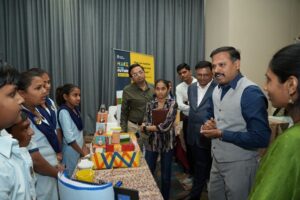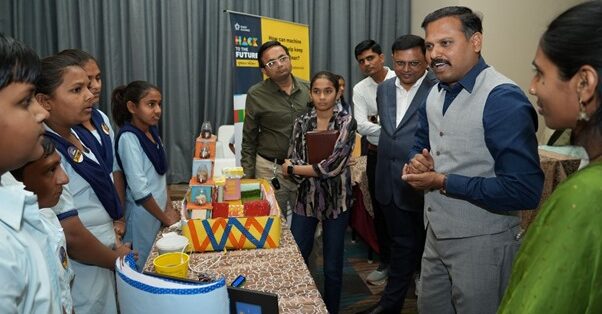MyCode Initiative Reaches 3. 8 Lakh Students, Advancing NEP 2020 Goals in Gujarat
BILKULONLINE
Gandhinagar, June 4: The Gujarat Council of School Education–Samagra Shiksha (GCSE-SS) is advancing NEP 2020 by promoting digital literacy and 21st-century skills in public education through the MyCode project, where 470 Master Trainers have equipped 8,652 government school educators with future-ready pedagogies, reaching over 3,83,636 learners across Gujarat.
Since 2022, MyCode, a collaborative initiative by GCSE-SS, Capgemini, and Quest Alliance, has introduced computational thinking (CT) in government schools, enabling students, especially from digitally underserved communities in Ahmedabad, Bahashantha, Kheda, Anand, and other districts, to engage in STEM clubs, ideathons, hackathons, and career exploration sessions. The program, running in 8,810 schools across 13 districts, has driven a shift in pedagogy by equipping educators to use technology and foster discussions around self, gender, and well-being, helping build STEM mindsets.
Mycode culminated in February this year, with the Hack to the Future (HttF) inter-school hackathon held in Gandhinagar. The event featured 15 student prototypes, like a Fire Fighting Robot that detects fires and activates a foam suppression system, and a Smart Farming System that uses IR sensors to detect animal intrusions and protect crops with solar-powered lights that the learners built with the help of their educators. A standout project was a women’s safety device designed by Anjaliben Ambalal Vanzara, a Class 7 student from Chhipadi Kanya Shala, Kheda district. The device fitted with a panic button alerts the nearest police station in emergencies. “We created this device after recognizing the challenges girls face due to safety concerns, which often lead to school dropouts or restricted mobility,” Anjaliben shared.
HttF also created an opportunity for learners and educators to interact with Ranjeeth Kumar J, IAS, the State Project Director of GCSE-SS. He noted that “NEP 2020 has encouraged computational thinking, problem-solving, and critical reasoning as foundational competencies for 21st-century learners. HttF is a testament to fostering innovation, technological empowerment, and STEM excellence within public education. By championing such interventions, the government is accelerating the adoption of computational literacy and ensuring that learners, particularly from underserved communities, are equipped with critical thinking and digital fluency to thrive in the future workplace.”
Anurag Pratap, Vice President and CSR Leader, India, Capgemini, said, “This initiative aims to equip learners with essential tech skills while providing a collaborative platform to explore solutions for climate resilience, gender equity, safer living environments, and overall well-being. Through hackathons, students engage in hands-on learning, applying programming, design thinking, and technology to address real-world challenges.”
The initiative has brought about notable change among learners in the past six months, where 48% reported using AI tools, 53% used technology for learning, 71% worked with Scratch programming, and 68% participated in hackathons.
Neha Parti, Director-Schools, Quest Alliance, said, “Our approach to ideathons and hackathons is designed to nurture problem-solving and creativity among learners. Through these experiences, students gain the confidence and skills to develop impactful solutions for themselves and their communities. By using technology, they materialize envisioned solutions to real-world problems.”
A recent evaluation of the program’s impact across 25 schools in Ahmedabad, Kheda, Gandhinagar, Chhota Udepur, and Aravalli found that 77% of educators supported continuing the program, citing improvements in computational thinking and digital literacy among both learners and educators. Over half the educators reported enhanced student outcomes in critical thinking, innovation, interest in STEM, and overall performance since its implementation. The next phase of the program will develop a digital training module for teachers to facilitate ideathons and hackathons, fostering critical thinking and problem-solving among learners.
Quest Alliance is a not-for-profit trust that equips young people with 21st century skills by enabling self-learning. We design scalable solutions that enable educators to address critical gaps for quality education and skills training. We facilitate learning networks and collaboration to bring about systemic change fuelled by research and innovation



